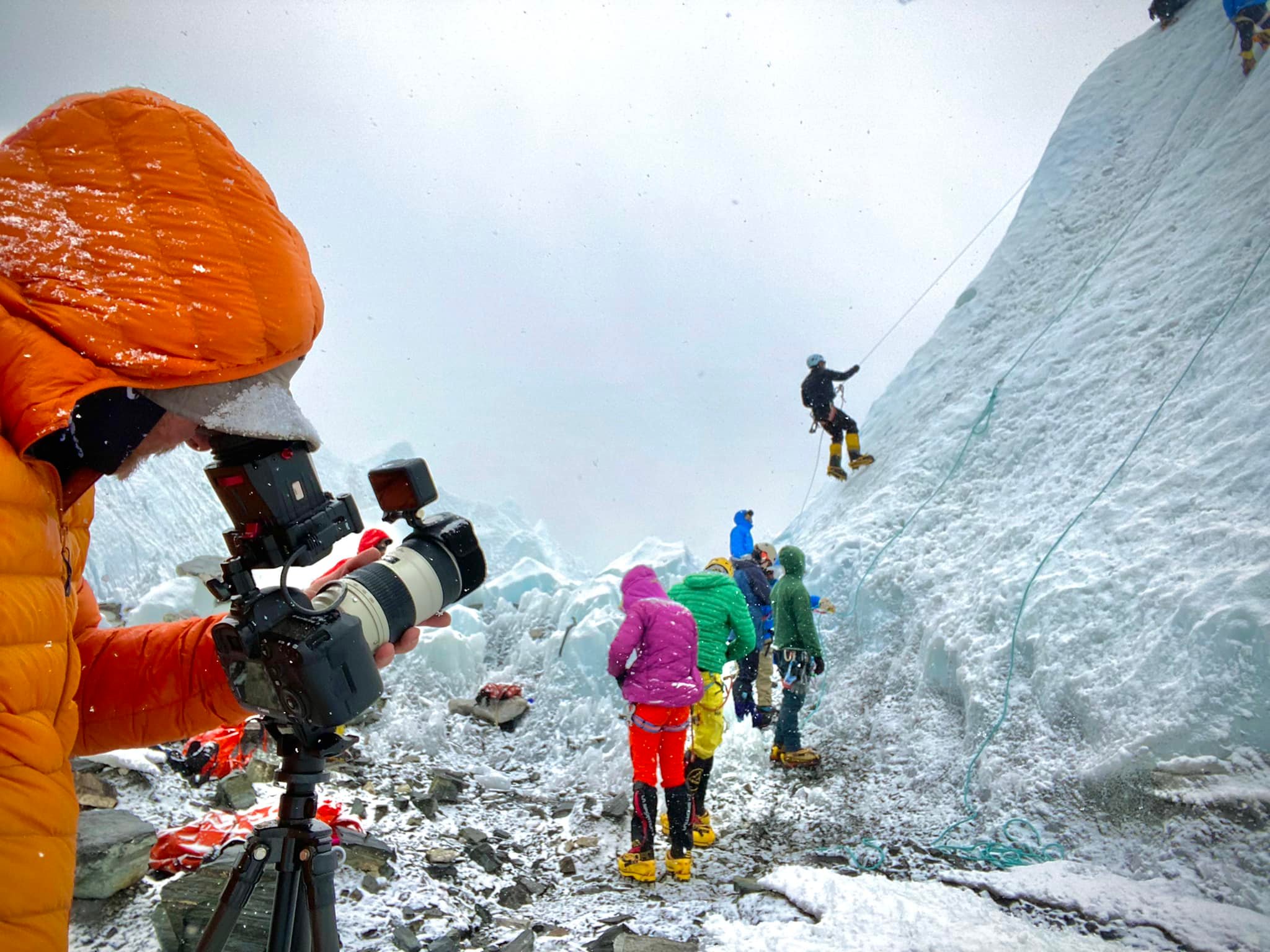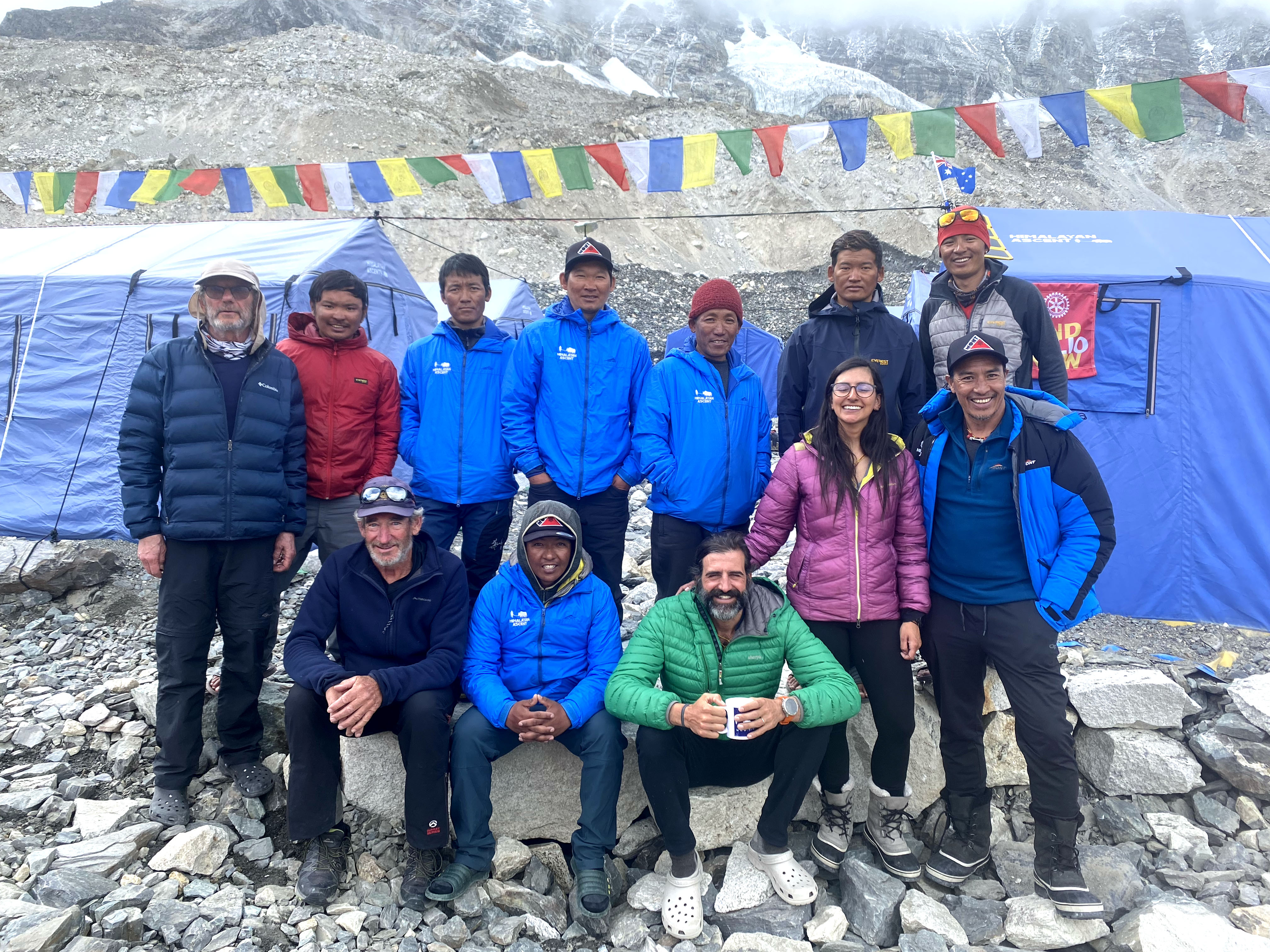It was an extraordinary, inherently risky adventure that raised $450,000-plus for Rotary's End Polio Now campaign. Veteran adventurer Ken Hutt's attempt to become the first man to legally paraglide off the top of Mt Everest is captured in a new documentary by QUT's Dr Joe Carter.
Following its world premiere at the Kathmandu International Mountain Film Festival, Fly from Everest will make its red-carpet debut in Brisbane at QUT's Gardens Theatre on Monday 27 November.
The gala event will host all the film's stars and crew, including the Rotary District Governor Paul Roger and the Vice-President of Polio Australia Gary Newton. A Q&A session after the film will allow the audience to ask questions about Everest, and what it takes to fly a paraglider in the Himalayas.
Dr Carter, who has a PhD in extreme sports films, teaches in the film and television degree within QUT's School of Creative Practice. In 2022 he spent three months on location in Nepal with 63-year-old Ken, including living for 6 weeks at Everest Base Camp.
"Planning to shoot a documentary about such a high-risk attempt with so many unpredictable variables was very challenging. Climbing Mt Everest is fraught with dangers at the best of times for even the most experienced mountaineers – so trying to fly a paraglider from the mountain adds to those dangers exponentially," Dr Carter said.
"A very experienced Sherpa guide died on our first day on the mountain and then three other climbers died on Everest that month, while two of our own team were airlifted out in medical emergencies. It is a truly brutal environment, totally unforgiving.
"But even with all the possible outcomes we were planning for, what happened to Ken above camp 2 (6500m) was something none of us predicted.
"When he developed a life-threatening chest infection on the way to camp 3, the whole team at Everest basecamp knew he would need to somehow get back down to camp 2 for a helicopter evacuation straight to hospital in Kathmandu.

"However, after speaking to his wife on the satellite phone and his son who was at basecamp, Ken chose a different option. In that moment, I knew our film had just changed gears into something new, something special.
"I don't want to spoil the film for audiences who haven't seen it, but it is fair to say that Ken's achievement cannot be underestimated. My film reflects his determination, sacrifice, and bravery along the journey. He raised awareness and more than $450,000 for a vitally important cause."
Dr Carter filmed and directed the documentary, researching and filming in some of Australia's best paragliding locations and on location in the Nepalese Himalayas. During the six weeks acclimatisation period at Everest base camp, he worked on camera skills with the climbers and sherpas who would be filming Ken up higher on Mt Everest.
As a research project, he was also able to test his PhD findings around extreme sports narratives, and also test prototype cameras, new cold-temperature lithium batteries and a super lightweight 360-degree surround sound microphone, all in extreme conditions and altitude.

Dr Carter said the film was now touring international film festivals.
"The international premiere at the Kathmandu International Mountain Film Festival was particularly special as it meant some of the Nepalese sherpas who feature in the film were able to attend with their families," Dr Carter said.
"The ending is in some ways quite unexpected, and it is an uplifting story with great emotional impact, especially when Ken is reunited with his son at basecamp.
"Ken is a remarkable, inspiring individual who has changed the lives of many people we met along this film journey, and his attempt to fly the message about polio from the roof of the world has had a huge effect already."
Polio is a highly infectious viral disease that largely affects children under 5 years of age and can cause long-term disability, paralysis, and death. In 1988, when the Global Polio Eradication Initiative was launched, polio was present in more than 125 countries. Due to immunisation of almost three billion children since then, wild polio is now found only in Afghanistan and Pakistan.
"If the polio eradication program stops, the World Health Organisation predicts there could easily be 200,000 new cases a year within a decade. Ken has been devoted to this cause for many years," Dr Carter said.
Tickets to Fly From Everest are available at: https://www.gardenstheatre.qut.edu.au/whats-on/2021/2023/fly-from-everest-qld-premiere-red-carpet-launch-event
Main image: QUT filmmaker Dr Joe Carter with Ken Hutt at Everest Base Camp






